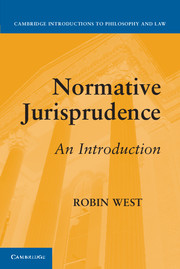Conclusion
Reconstructing Normative Jurisprudence
Published online by Cambridge University Press: 05 June 2012
Summary
I have tried to show in this book that over the past fifty years, three major movements in legal philosophy have all largely lost the normative dimensions that at one time defined them: contemporary natural lawyers only rarely discuss what justice requires of law; legal positivists have abandoned the censorial project of criticizing positive law on the basis of a moral measure independent of law itself, and critical scholars have basically renounced their once distinctive moral brief against liberal legalism. This did not, however, happen in a vacuum, nor are the three trends in positivism, natural law, and critical legal studies unrelated to each other. Rather, legal scholarship in general, over the past quarter century, has increasingly leaned against normative argument. Arguments such as the following are now often explicitly disparaged, particularly at the elite American law schools: “the law should be thus and so,” “the law requires this but should not,” “it should require that instead,” “law forbids something that should be permitted or ignores a problem it should address,” or simply “this law is unjust and should be changed” or “this social situation is unjust and therefore needs legal redress.” These arguments, so the complaints go, are “moralistic,” inappropriately political, “mere advocacy,” “adversarial,” or, worst of all, “brief-writing” rather than insightfully explanatory of some deep sociolegal phenomenon. The philosophical movement in the three jurisprudential traditions I have described away from normative interpretations is clearly reflected in this contemporary movement away from normativity in legal scholarship generally.
- Type
- Chapter
- Information
- Normative JurisprudenceAn Introduction, pp. 177 - 204Publisher: Cambridge University PressPrint publication year: 2011

